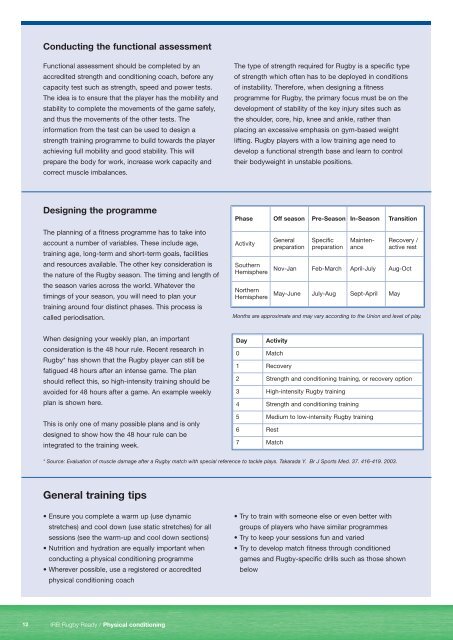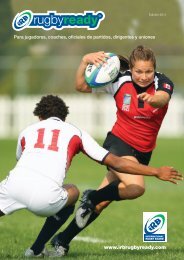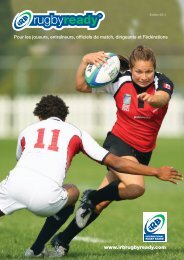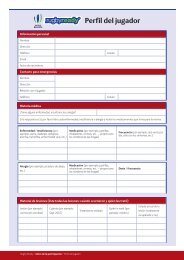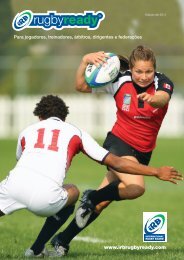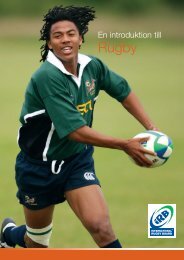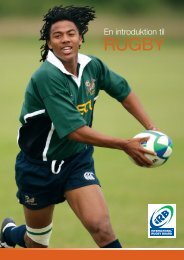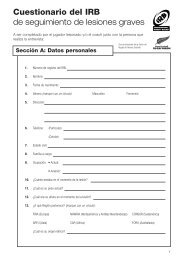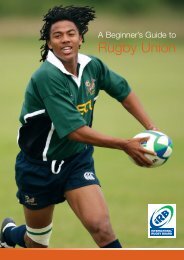IRB Beginner's Guide to Rugby - IRB Rugby Ready
IRB Beginner's Guide to Rugby - IRB Rugby Ready
IRB Beginner's Guide to Rugby - IRB Rugby Ready
Create successful ePaper yourself
Turn your PDF publications into a flip-book with our unique Google optimized e-Paper software.
Conducting the functional assessment<br />
Functional assessment should be completed by an<br />
accredited strength and conditioning coach, before any<br />
capacity test such as strength, speed and power tests.<br />
The idea is <strong>to</strong> ensure that the player has the mobility and<br />
stability <strong>to</strong> complete the movements of the game safely,<br />
and thus the movements of the other tests. The<br />
information from the test can be used <strong>to</strong> design a<br />
strength training programme <strong>to</strong> build <strong>to</strong>wards the player<br />
achieving full mobility and good stability. This will<br />
prepare the body for work, increase work capacity and<br />
correct muscle imbalances.<br />
The type of strength required for <strong>Rugby</strong> is a specific type<br />
of strength which often has <strong>to</strong> be deployed in conditions<br />
of instability. Therefore, when designing a fitness<br />
programme for <strong>Rugby</strong>, the primary focus must be on the<br />
development of stability of the key injury sites such as<br />
the shoulder, core, hip, knee and ankle, rather than<br />
placing an excessive emphasis on gym-based weight<br />
lifting. <strong>Rugby</strong> players with a low training age need <strong>to</strong><br />
develop a functional strength base and learn <strong>to</strong> control<br />
their bodyweight in unstable positions.<br />
Designing the programme<br />
The planning of a fitness programme has <strong>to</strong> take in<strong>to</strong><br />
account a number of variables. These include age,<br />
training age, long-term and short-term goals, facilities<br />
and resources available. The other key consideration is<br />
the nature of the <strong>Rugby</strong> season. The timing and length of<br />
the season varies across the world. Whatever the<br />
timings of your season, you will need <strong>to</strong> plan your<br />
training around four distinct phases. This process is<br />
called periodisation.<br />
Phase Off season Pre-Season In-Season Transition<br />
Activity<br />
Southern<br />
Hemisphere<br />
Northern<br />
Hemisphere<br />
General<br />
preparation<br />
Specific<br />
preparation<br />
Mainten -<br />
ance<br />
Recovery /<br />
active rest<br />
Nov-Jan Feb-March April-July Aug-Oct<br />
May-June July-Aug Sept-April May<br />
Months are approximate and may vary according <strong>to</strong> the Union and level of play.<br />
When designing your weekly plan, an important<br />
consideration is the 48 hour rule. Recent research in<br />
<strong>Rugby</strong>* has shown that the <strong>Rugby</strong> player can still be<br />
fatigued 48 hours after an intense game. The plan<br />
should reflect this, so high-intensity training should be<br />
avoided for 48 hours after a game. An example weekly<br />
plan is shown here.<br />
This is only one of many possible plans and is only<br />
designed <strong>to</strong> show how the 48 hour rule can be<br />
integrated <strong>to</strong> the training week.<br />
Day Activity<br />
0 Match<br />
1 Recovery<br />
2 Strength and conditioning training, or recovery option<br />
3 High-intensity <strong>Rugby</strong> training<br />
4 Strength and conditioning training<br />
5 Medium <strong>to</strong> low-intensity <strong>Rugby</strong> training<br />
6 Rest<br />
7 Match<br />
* Source: Evaluation of muscle damage after a <strong>Rugby</strong> match with special reference <strong>to</strong> tackle plays. Takarada Y. Br J Sports Med. 37. 416-419. 2003.<br />
General training tips<br />
• Ensure you complete a warm up (use dynamic<br />
stretches) and cool down (use static stretches) for all<br />
sessions (see the warm-up and cool down sections)<br />
• Nutrition and hydration are equally important when<br />
conducting a physical conditioning programme<br />
• Wherever possible, use a registered or accredited<br />
physical conditioning coach<br />
• Try <strong>to</strong> train with someone else or even better with<br />
groups of players who have similar programmes<br />
• Try <strong>to</strong> keep your sessions fun and varied<br />
• Try <strong>to</strong> develop match fitness through conditioned<br />
games and <strong>Rugby</strong>-specific drills such as those shown<br />
below<br />
12<br />
<strong>IRB</strong> <strong>Rugby</strong> <strong>Ready</strong> / Physical conditioning


